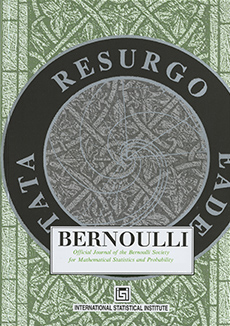Abstract
We present a framework for obtaining explicit bounds on the rate of convergence to equilibrium of a Markov chain on a general state space, with respect to both total variation and Wasserstein distances. For Wasserstein bounds, our main tool is Steinsaltz’s convergence theorem for locally contractive random dynamical systems. We describe practical methods for finding Steinsaltz’s “drift functions” that prove local contractivity. We then use the idea of “one-shot coupling” to derive criteria that give bounds for total variation distances in terms of Wasserstein distances. Our methods are applied to two examples: a two-component Gibbs sampler for the Normal distribution and a random logistic dynamical system.
Citation
Neal Madras. Deniz Sezer. "Quantitative bounds for Markov chain convergence: Wasserstein and total variation distances." Bernoulli 16 (3) 882 - 908, August 2010. https://doi.org/10.3150/09-BEJ238
Information





